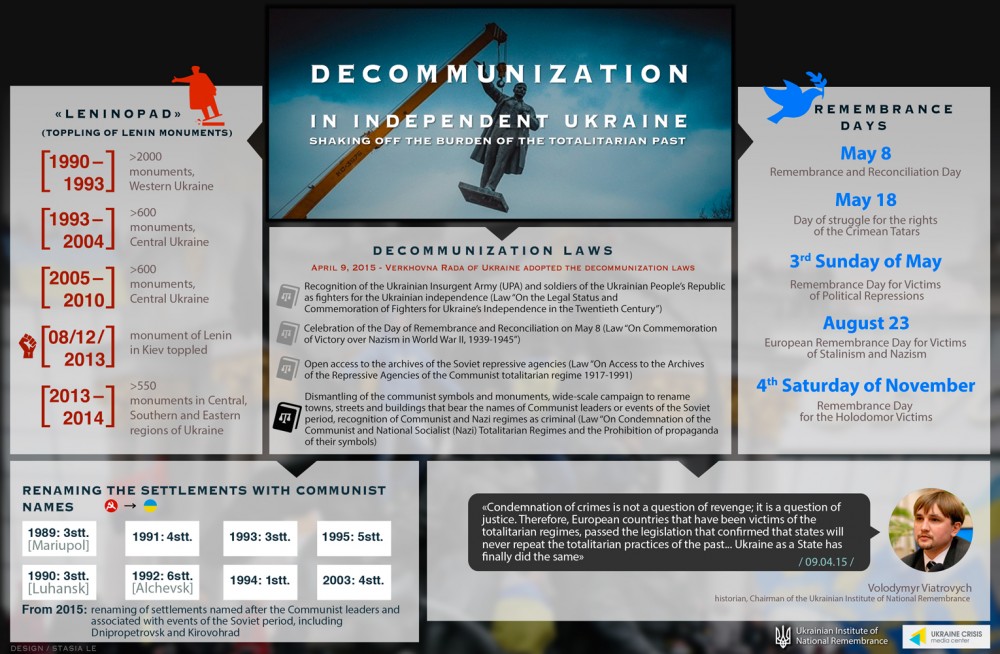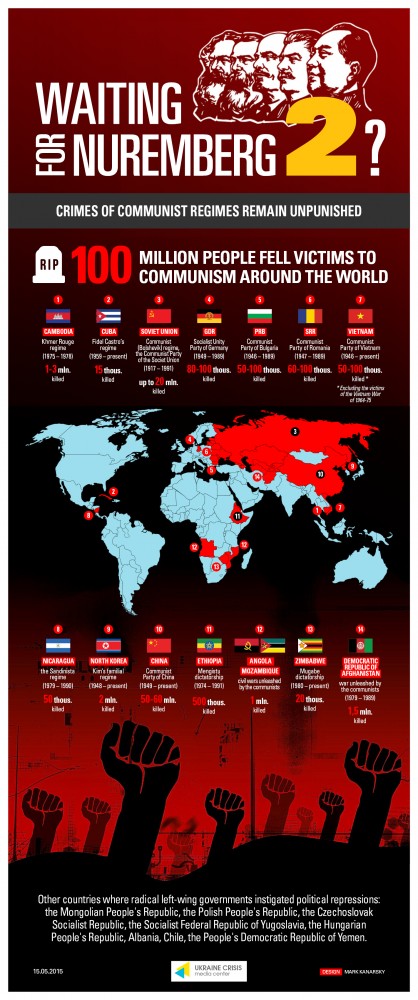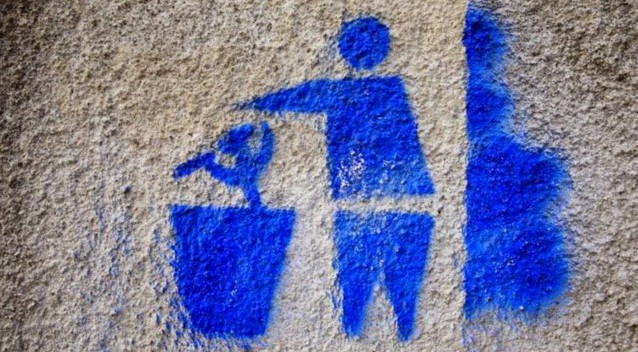On April 9, 2015, four laws of the so-called "decommunization package" were passed by the Ukrainian Parliament. These laws provide state recognition of fighters for Ukraine's independence in the twentieth century, allow the opening of archives related to human rights violations during the Soviet era, condemn Communist and Nazi totalitarian regimes, and perpetuate victory over Nazism in the Second World War.
The initiators of decommunization rely primarily on European experience.
Laws allowing the opening of archives were adopted in Germany, Czech Republic, Poland, Slovakia, Hungary and other countries after the fall of Communist regimes. The criminal nature of these regimes was also condemned on the legislative level in a range of Eastern European and Baltic states: the use of Soviet and Nazi symbols is now banned in Lithuania, Latvia, Estonia and, since recently, also in Georgia.
"One of the preconditions which allows to avoid similar crimes in the future is the knowledge of history. Furthermore, moral assessment and condemnation of the committed crimes are essential for education of younger generations. [...] Therefore, the Assembly strongly condemns the massive human rights violations committed by the totalitarian Communist regimes and expresses sympathy and understanding to the victims of these crimes, and recognizes their suffering,"
states the "Need for international condemnation of crimes of totalitarian Communist regimes" resolution of the Parliamentary Assembly of the European Council from 2006.
These words are directly related to Ukraine, which has lost millions of inhabitants as a result of repressions, deportations, and genocide organized by the Soviet regime.

However, news about the decommunization laws gave rise to a range of manipulation, myths, and fear-mongering that is increasingly distributed throughout mass media with the help of Russian propaganda. Unfortunately, there are few people among readers, viewers, listeners, and even journalists who read these laws in full before making any attempts to debate and evaluate them.
We'll try to answer the most common criticisms of the decommunization initiative that are spread in the press.
- "Decommunization is untimely. There are other more pressing issues to be addressed such as war, poverty, corruption, etc."
This argument has been used since the time when Ukraine gained its independence. However, the experience of Eastern European countries and Baltic States suggests the opposite: in the states where decommunization was enacted immediately after the fall of totalitarian regimes, the level of corruption was much lower while GDP per capita became much higher.
Besides, without the decommunization which should have been due right after independence was gained, Ukraine mothballed nostalgia for its Soviet past, a sentiment shared by a considerable number of her citizens. This nostalgia was predominantly spread throughout Crimea, Sevastopol, Donetsk and Luhansk oblasts, where Russia used it to prepare grounds for occupation of Ukrainian territory and a separatist rebellion in the East.
The annexation of Crimea and the war in Donbas resulted in multibillion-dollar losses for Ukraine: overall, the country lost over 20% of its economic potential.
However, in other regions, where the pro-Soviet sentiment was not as pronounced, the aggressor could not undermine the situation and failed to create the preconditions necessary for invasion.
Thus, decommunization today may save us from future economic losses.
- "These laws divert public attention from economic and political reforms"
First of all, decommunization does not impede any reforms in any way. It neither prohibits nor restrains the need to improve legislation and fight corruption.
Secondly, reforms and decommunization are interrelated processes. The wellbeing of the economy, a society intolerant of corruption, fair court procedures, democratic and competitive elections, and a responsible political elite – all these things are incompatible with the dominance of Soviet values in the country.
An average 'Soviet' citizen believes that everything must be decided by the state and perceives state authorities as nearly sacred. Instead of demanding that state officials perform their work, these people prefer to use informal relations or bribes. These circumstances are insufficient for building businesses or undertaking initiatives in general - if rights are violated, reaching justice and seeking protection in court and law enforcement bodies is impossible.
Thus, decommunization may be considered a necessary prerequisite for successful reforms.
- "The renaming of streets and towns requires huge expenses, and people will have to change their documents at their own costs"

Bill #2558 "On condemnation of communist and national-socialist (Nazi) totalitarian regimes in Ukraine and prohibition of propaganda of their symbols" states that "procedures and timeframes" will be applied for renaming streets and settlements which are named in honor of the Communist Party and the Soviet regime.
For this, no large costs are necessary.
The main expenses will be incurred in replacing signs with names of streets and cities, and road signs. For example, production of one plate in Kyiv would cost at least 100 hryvnias, but if you order a large batch the manufacturing costs will be lower. Furthermore, in villages or small towns not all the houses have plates with street names.
Changes to roadmaps and other maps are already made regularly as cities grow and develop, new streets appear, and public transport routes constantly change.
There are no laws requiring any replacement of passports or other documents providing evidence of ownership for certain real estate due to the renaming of streets or cities. All documents with old names will remain valid. Changes to the documents will only be made when concluding sale contracts, transfer of property or inheritance. They will not require any extra payments.
Only legal entities would have to pay 51 hryvnia in order to change the name of the street or settlement in their constituent documents. Under the new law, however, this procedure is free.
- "The society will not accept the change of street and city names, especially older people, for whom the names of Soviet era name are sacred"
Although mostly elderly people are nostalgic about the Soviet past, not all the pensioners and veterans of World War II share 'Soviet values'. Their nostalgia for the USSR is most commonly related to memories of their youth that are free from any political ideas.
It will take time to acclimatize to the new names. Today the majority of Ukrainians do not remember that Mariupol held the name of Zhdanov, Alchevsk used to be Komunarsk, Luhansk was Voroshilovgrad and Zmiyiv in the Kharkiv Oblast was named after the Czech Communist Gottwald.
An average resident of Kyiv may hardly remember that the well-known vul. Bankova and Hrushevskoho and the Maidan Nezalezhnosti Square were vul. Ordzhonikidze, Kirov, and the October Revolution Square, respectively.
The earlier we change the name, the quicker the community will get used to it.
- "The law will complicate historical research of the Soviet period"
None of the adopted acts ban or restrain any research .They are included in the exceptions and are not subject to any legal restrictions imposed by the law. Moreover, the state will investigate the crimes of Nazi and Communist regimes in Ukraine, distribute information about them in society and urge NGOs and other organizations to do the same.
The requirement that bans the denial of the criminal nature of the Nazi and Communist regimes and falsification of history in general actually concerns only educational materials such as textbooks for schools and universities.
It may also hinder distribution of pseudo-historical leaflets disguised as scientific research from Russian propagandist media on Ukrainian territory.
However, it is now the responsibility of special services, not scientists.
- "Recognition of OUN and UPA fighters for independence shall prevent objective investigation of historical events, including the Polish-Ukrainian conflict in the first half of the 20th century"
The adopted laws do not prevent an objective study of the period of struggle for Ukraine's independence in the 20th century.
Eastern European countries adopted similar laws and provided similar status to fighters for independence or participants of the resistance movement. For example, in the Czech Law of 1993 on the unlawfulness of the Communist regime, the resistance to this regime is recognized as "legitimate, fair, morally justified and worthy of respect."
The recognition of the legitimacy of a struggle for independence in no way denies the fact that during the struggle certain individuals could commit crimes. The law does not prohibit investigating such cases and publishing the research results. For example, Poland commemorates soldiers of the Home Army but does not allow doing so to preclude investigation of crimes committed by the members of the Polish underground against Ukrainian civilians during the Second World War.
Finally, the current law "On Holodomor of 1932-1933 in Ukraine" bans public denial of the Great Famine but at the same time does not impede any research or debates.
These new laws do not create any barriers for debates about the Soviet past.
- "The adopted laws prohibit the Communist ideology, thus limiting freedom of speech and freedom of beliefs"

The adopted laws do not prohibit either the Communist or any other ideology. They condemn the Nazi and Communist totalitarian regimes, recognize them as having a criminal character, and prohibit public use of their symbols.
Laws prohibiting public denial or justification of crimes of the Nazi regime are in effect in Austria, Belgium, Germany, Poland, Czech Republic, Slovakia, Hungary, Baltic States, France, Switzerland, Canada and Israel. Two UN General Assembly resolutions of November 21, 2005 and January 26, 2007, among other things, "reject any denial of the Holocaust as a historic event, either in full or in part" and condemn "without any denial of the Holocaust without any remarks."
- "The adopted laws annul the holiday on May 9 and honoring of veterans of the Great Patriotic War"
May 9 is still a public holiday and a day off. Additionally, a Remembrance and Reconciliation Day is introduced, which will be celebrated on May 8. On this day all the victims of World War II in Ukraine will be honored.
The adopted laws proclaim respect of the victory over Nazism in the World War II to veterans of the war, as well as the participants of the Ukrainian liberation movement and victims of Nazism.
War veterans are still recognized by Ukrainian law, including those who were soldiers of the Red Army and fought against Nazism.
Monuments that honor the participants and victims of war shall be put in good order and preserved, and the limitation of the public use of Soviet symbols does not apply to monuments and tombstones.
- "It will complicate Ukraine's relations with Russia and other states where the Communist Party is in power - for example, with China"
These laws in no way prohibit state symbols of China or any other country in the world. In addition, China's relations with other countries are guided primarily by economic interests, not ideological issues.
The absence of such laws did not stop Russia from waging trade wars against Ukraine, annexing Crimea and unleashing the war in Donbas.
Nostalgia for the Soviet era and Soviet identity were a prerequisite for the Russian invasion, as the intruders had a relatively high level of support in the occupied territories and encountered limited resistance.
- "Russian researchers will not be able to access the archives of the Soviet secret police in Ukraine"
On the contrary, the law on access to archival records of the Soviet repressive bodies simplifies the access as much as possible.
Foreigners legally residing in Ukraine will have the same rights to access the archives as any Ukrainian citizen.
However, in Russia or other former Soviet countries the information that is now open in Ukraine may continue to hold the status of secret or classified information. That is why its publication in these countries may be prohibited.
And yet, Ukraine is not liable for any laws that are in force in the other states, nor for any fears that dominate the souls of their special services officers.






